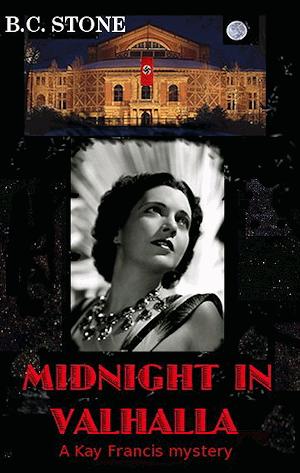B. C. Stone Interview

———————————————————-
B. C. Stone
Author of Murder at the Belmar: A Kay Francis mystery,
Midnight in Valhalla: A Kay Francis mystery, and
Coda in Black (Peter Warlock Mysteries)
Blog: http://vagrantmoodwp.wordpress.com/
———————————————————-
What motivates you to write and how did you get started?
I’ve always had a need to write. I’m not sure where the motivation comes from. I always liked looking things up and finding out the answers, which may explain my preference for the mystery genre. Until recently I’ve done mostly academic stuff: nonfiction, book reviews and the like. But more recently the impulse has taken a turn to fiction.
What’s most rewarding about writing?
Difficult to say. I guess it’s the satisfaction of seeing my ideas down in print in a coherent, compelling form. The other thing is getting feedback, positive or otherwise, from readers. It’s flattering that they take the time to read something I wrote. Also rewarding as a mystery writer is disguising the villain so the reader doesn’t guess who done it right away. In a different sense, it’s rewarding to polish and edit. My motto is: love the editing, hate the (original) writing. Nothing so terrifying as a blank page.
What’s your favorite genre and why?
I’ve always been a fan of old movies, films noirs in particular and so that preference must have morphed into a love of the American hardboiled mystery story. More recently I’ve developed a fondness for the classic British detective mystery, often referred to as the cozy. In nonfiction I like biographies and history.
Where do your characters come from?
Perhaps because of above-mentioned fondness for old movies, I tend to see, and hear, my characters as scenes from movies. My characters flow out of the plot, though not always. I like creating colorful names for characters and try to have the name reflect the character’s personality, or his profession.
Who is an author who inspires you and why?
There have been many. Raymond Chandler, because he was great at mood and atmosphere through his mastery of just the exact words and phrases to describe a setting or character. Dashiell Hammett, because he was such a good storyteller and for his clean style. And Agatha Christie, also a great storyteller, but because she was so darn clever in constructing those puzzles.
What do you look for in other people’s books?
Fun characters, clever (but plausible) plots, and a smattering of mood, setting and atmosphere. Concise stories too. I prefer books less than two hundred pages.
What are you writing now?
I’m currently working on Peril in Paradise, the third Kay Francis mystery, set in Hollywood in the early 1930s and with her most famous film, Trouble in Paradise, serving as the backdrop.
What kind of book would you like to be known for?
Tough question. I think back on a quote by an unlikely literary role model, Errol Flynn, who said he’d like etched on his tombstone, “they read my stuff.” Actually Flynn was a writer of no mean accomplishment.
But otherwise, I suppose it would be the book I’ve yet to write. For now, I’d like to be known as a writer of entertaining mysteries set in the 1930s that effectively recall the era through setting and characters.
What has writing taught you about yourself?
Perhaps the toughest question of all. I’m still learning as I go. One of the things is that I have a sense of discipline and can carry through an idea to a tangible completion. Also, the realities of marketing and getting a book out there have made me realize I’m more sociable and less an introvert than I had thought.
How has your life experience influenced your writing?
We all bring a lot of ourselves to writing, consciously or not. My own quirk is that I prefer to have visited, even more so, have lived in, the locale where my novels are set, though with so much information online I don’t think this is absolutely necessary in all cases.
What encouraging advice can you offer new writers?
Keep writing, don’t stop. Write a little bit every day. Talk to fellow writers through writer’s groups and other venues. Read the masters, of course. And read the better writing blogs, but don’t spend too much time reading them.